Cloud hosting involves utilizing a system of linked servers situated in different data centers across the globe to allocate and oversee resources. Cloud server hosting has become the standard for various applications and services and has revolutionized IT for all business sizes with cost-effective, flexible and scalable solutions.
Top 6 Cloud Server Hosting For Small Businesses 2024
- Kamatera – Best Cloud Server Hosting Overall
- Webdock – Best Unmanaged Cloud Hosting
- IONOS – Top Cloud Hosting for Scalability
- HostArmada – Best Shared Cloud Hosting
- Hostinger – Best Features Cloud Hosting
- A2 Hosting – Fastest Cloud Hosting with Turbo servers
- Cloudways – Top Managed Clouds Hosting
The Best Cloud Server Hosting Providers (Bought and Tested)






Kamatera is the best provider because of its cost-effective cloud hosting service with a flexible scaling option, pay-per-usage model, and the ability to cancel anytime. Kamatera offers cloud server infrastructure distributed across the globe and allows businesses to set up their servers on an operating system of their choice. Their servers are flexible and affordable for any level of computing.
- Overall score – 5.0
- Pricing – 5.0
- Features – 5.0
- Performance – 5.0
- Support – 5.0
- User-friendliness – 5.0
Pricing – 5.0: Kamatera’s cloud hosting prices start from $4 per month, which includes 1 public IP, 5,000 GB per month of data transfer connected at 10 Gbit/sec, 1 vCPU (2,667 MHz), 1,024 MB RAM, and 10 SSD storage. Tailored options are available for customization according to individual preferences. The cost varies based on the specific needs of the users. The pay-as-you-go approach is currently available, allowing for flexible payment based on usage. Kamatera offers reasonably-priced cloud hosting that users can conveniently pay for with major credit cards.
Features – 5.0: Kamatera offers a scalable infrastructure with VMs, storage, and global data centers for optimized performance. It supports various systems for deployment, including Windows Server, Linux (e.g., CentOS, Ubuntu, Debian), and Free BSD. Kamatera provides networking, backup, and snapshot features for better infrastructure, security, and data protection.
Performance – 5.0: Kamatera offers global data centers equipped with redundant hardware and high availability features such as load balancing, failover, and resource scaling. These measures are implemented to minimize risks and reduce service disruptions for customers. Kamatera provides backup and snapshot options and redundancy in infrastructure and connectivity to ensure data protection and disaster recovery.
Support – 5.0: Kamatera provides swift customer support through various channels, including live chat, tickets, and email. Their 24/7 team consists of cloud hosting experts who are well-versed in assisting customers with inquiries, providing technical guidance, and troubleshooting Kamatera’s services. In addition to direct assistance, Kamatera also offers self-help options such as documentation, tutorials, and a knowledge base to empower users with resources for independent problem-solving.
User-Friendliness – 5.0: Kamatera has a user-friendly UI for non-techies and allows for easy deployment of apps and operating systems. They streamline infrastructure management through automation, orchestration, and on-demand self-service cloud hosting. Kamatera’s self-service cloud hosting enables users to manage resources and tasks and add instances easily. Their customizable plans cater to growing businesses and provide quick resource adjustments.
Additional Parameters – High Availability: Kamatera offers reliable infrastructure featuring backup hardware and fail-safe systems to ensure continuity and maximum uptime. This feature guarantees the availability of your apps and services, even in situations where hardware malfunctions or unforeseen disturbances occur.
Pros and Cons
Pros:
- Flexible Infrastructure
- Multiple Operating Systems
- Pay-as-You-Go Pricing
- One-Click Deployment
- Service Level Agreements (SLAs)
- Simple Interface
- Self-Service Capabilities
Cons:
- Learning curve requirement
- Pricey add-on features
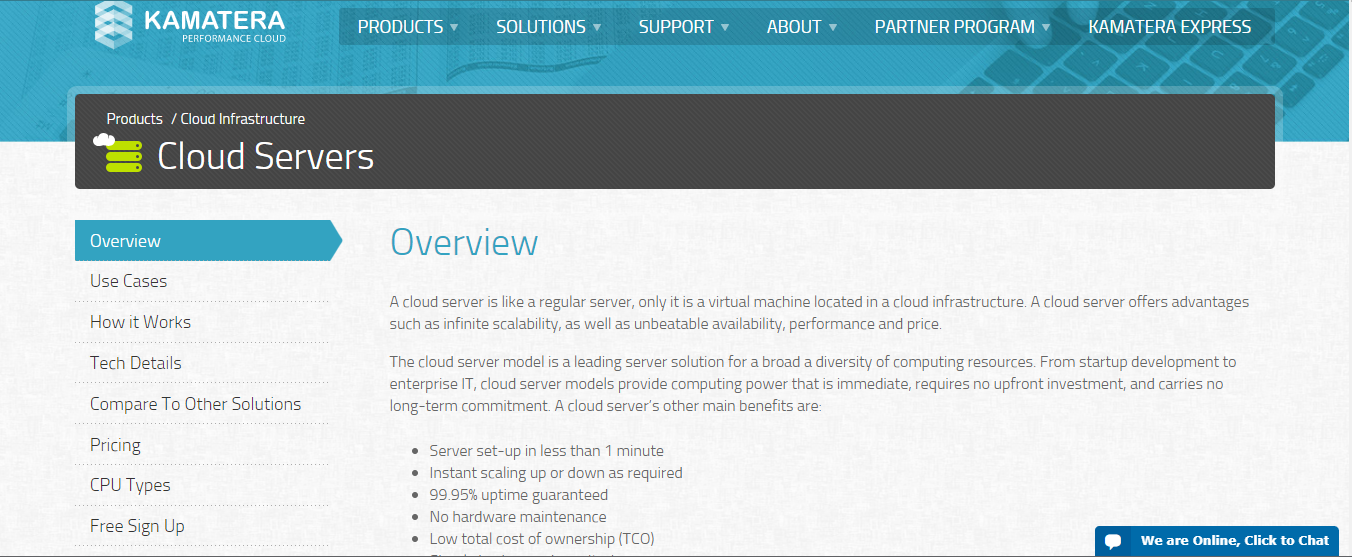






Webdock offers unmanaged cloud hosting that gives users complete control over server selection, configuration, security, and administrative functions. Users have the flexibility to lease a public cloud architecture to store and manage their websites.
- Overall score – 4.9
- Pricing – 4.9
- Features – 5.0
- Performance – 5.0
- Support – 4.9
- User-friendliness – 5.0
Pricing – 4.9: Webdock offers monthly cloud hosting pricing starting at $2.99 for the Intel Xeon plan. This plan includes 25 GB of SSD storage, a 2-thread CPU, 2 GB of RAM, and a 1 Gbit/s port. Additionally, they provide the Ryzen plan, which is priced at $3.99 per month. This plan includes 25 GB of SSD storage, a 1-thread CPU, 1 GB of RAM, and a 1Gbit/s port. Webdock accepts major credit cards as the mode of payment, ensuring a convenient and secure transaction process for their customers.
Features – 5.0: Webdock uses SSDs for storage, leading to faster speeds for website performance, data retrieval, and loading times. It uses an optimized hosting stack for better and more efficient handling of high traffic. Webdock has a custom control panel for efficient hosting management, offering deployment, DNS, SSL, and resource tracking. Webdock secures hosting with updates, firewalls, scans, and backups.
Performance – 5.0: Webdock ensures reliable hosting with an impressive track record of 100% uptime, achieved through a combination of robust infrastructure, dependable hardware, and strategic partnerships with reputable providers. They prioritize server redundancy measures to address potential hardware and network issues, employing redundant power sources, network connections, and RAID configurations for data protection.
Support – 4.9: Webdock provides customer support via ticketing, email, or live chat and strives for prompt responses to inquiries. They offer guides for hosting management. They also provide guidance, features, and troubleshooting resources, including community forums for user engagement and support. Webdock’s support team helps with hosting services like server configurations, app deployments, DNS management, SSL installations, and more.
User-Friendliness – 5.0: Webdock offers a user-friendly control panel for easy hosting management, including server, domain, DNS, backup, and hosting features with effortless deployment. Webdock simplifies server management with app installers for CMS, domain creation, email management, SSL configuration, resource monitoring, and one-click backups. Their simplified data protection also aids disaster recovery.
Additional Parameters – SSH Access: Webdock offers secure remote management and command-line access to your server through SSH (Secure Shell). The ability to access SSH enables skilled users to carry out administrative duties with efficiency.
Pros and Cons
Pros:
- Optimised Hosting Stack
- SSD Storage
- SSH Access
- Regular Update and Maintenance
- Monitoring and Alerts
Cons:
- Limited Service Offerings
- Limitations on advanced features or customization






IONOS is a prominent cloud hosting service provider, offering a flexible and adaptable infrastructure and enabling users to customize server resources according to their requirements. The functionality enables users to manage sudden surges in traffic and expand their infrastructure in tandem with the growth of their commercial enterprise.
- Overall score – 4.8
- Pricing – 4.8
- Features – 4.8
- Performance – 4.9
- Support – 4.8
- User-friendliness – 4.9
Pricing – 4.8: IONOS cloud hosting pricing starts at $11.52/month for 1 – 24 vCores CPU, 0.5 – 128 GB RAM, and 10 – 500 GB RAM. You can choose from hourly or monthly billing terms. PayPal and major credit cards are accepted for payment on IONOS.
Features – 4.8: IONOS offers flexible resources, multiple OS supports, SSD storage, load balancing, data protection, secure backups, dedicated servers, and disaster recovery for optimized performance and business continuity. IONOS secures customer data with firewalls, DDoS protection, and SSL/TLS certificates.
Performance – 4.9: IONOS offers safe and reliable hosting through advanced infrastructure and hardware. They ensure uptime with redundant networks and data centers while safeguarding customer data with firewalls, IDS/IPS, patches, and SSL/TLS. IONOS offers dependable hosting with SLAs for response times and remedies for disruptions.
Support – 4.8: IONOS has 24/7 customer support through phone, email, and live chat. They offer self-help through their knowledge base and community forum. Their website has documentation and tutorials for navigating the hosting platform and performing tasks.
User-Friendliness – 4.9: Managing cloud hosting is simplified through IONOS’s user-friendly control panel, effortless one-click installations, and informative tutorials. IONOS provides dedicated guides, advice, and models for individual applications. Users can quickly establish accounts without the need for manual server configuration or software installations.
Additional Parameters – Load Balancing: IONOS provides load balancing options that evenly allocate incoming traffic among numerous servers. Efficient workload distribution through load balancing can lead to better utilization of resources, enhanced performance, and increased availability.
Pros and Cons
Pros:
- Free DDoS protection
- Free SSL/TLS certificates
- Multiple data centers
- Data redundancy
- Wide range of services
Cons:
- Additional costs for add-on services
- Limited operating system options
- Learning curve for beginners
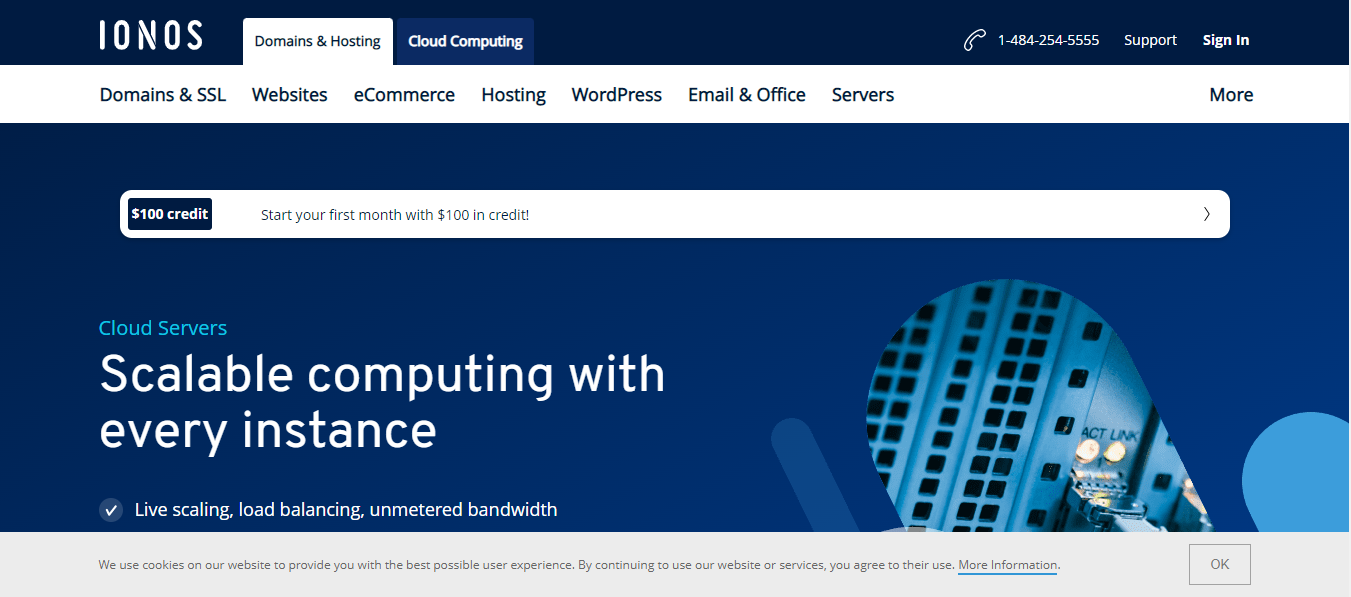





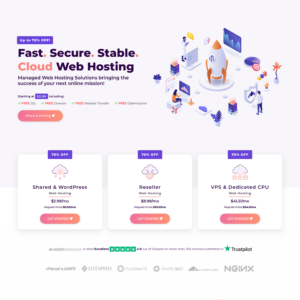
HostArmada is a company that provides cloud-based shared hosting solutions for websites. Combining the positive aspects of shared hosting and cloud infrastructure, HostArmada cloud hosting offers websites and applications dependable and adaptable hosting solutions.
- Overall score – 4.7
- Pricing – 4.7
- Features – 4.8
- Performance – 4.8
- Support – 4.7
- User-friendliness – 4.7
Pricing – 4.7: HostArmada cloud hosting pricing plans start with Start Dock, costing $2.49/month for 1 Website, 15GB SSD Storage, 2 Cores CPU, and 2GB RAM. You can choose to pay monthly, annually, biennially, and triennially. PayPal, Visa, Mastercard, American Express, Discover, Diners Club, JCB, and Union Pay credit cards are accepted for payment on HostArmada.
Features – 4.8: HostArmada offers fast website performance with SSD Cloud Storage and easy scalability with cloud hosting. They also offer flexible hosting options with SSL certificates for data encryption, a 1-click application installer, automatic daily backups, web server cache, 2 – 6 CPU Cores, 2 – 6 GB RAM, and free website transfers.
Performance – 4.8: HostArmada offers dependable cloud hosting with modern infrastructure, high-performance servers, SSD storage, and advanced network connectivity for stability and minimal downtime. Partnering with reliable data centers and utilizing redundancy measures for better uptime and server safety, they maintain servers for reliable service, with backups and cloud hosting for easy website restoration.
Support – 4.7: HostArmada offers 24/7 support to dedicated server clients via phone, email, live chat, and ticketing systems. The responsive and knowledgeable team can help users with any issues they encounter.
User-Friendliness – 4.7: HostArmada offers a dashboard for managing cloud hosting, including server, domain, email, and resource management, as well as one-click CMS and application installers. HostArmada offers one-click installers that simplify website setup and assist with website migration for users.
Additional Parameters – Enhanced Performance: HostArmada’s shared cloud hosting leverages cloud technology to enhance loading speeds and optimize performance. This system is designed to accommodate amplified traffic volumes without experiencing any bottlenecks.
Pros and Cons
Pros:
- Free domain
- Free SSL
- Daily backups
- Malware scan and removal
- WAF & IP firewall
Cons:
- Lack of advanced developer tools
- Prices increase on renewal







Hostinger cloud hosting provides numerous features, including scalability, rapid elasticity, flexibility, security, automation, pay-as-you-go plans, and rich feature sets with many freebies (SSL, CDN, website migration, domain registration/transfer, daily backups, and more).
- Overall score – 4.6
- Pricing – 4.6
- Features – 4.7
- Performance – 4.7
- Support – 4.6
- User-friendliness – 4.6
Pricing – 4.6: Hostinger cloud hosting plans start at $9.99/month plus three months free for 300 websites, 200 GB SSD Storage, 3 GB RAM, 2 CPU Cores, and unlimited bandwidth. Major credit cards, e-wallets, and cryptocurrency are accepted for payment on Hostinger.
Features – 4.7: Hostinger’s cloud hosting improves server performance, redundancy, and distributed resources, ensuring smooth performance during growth and spikes. They use SSD storage for faster access and a smoother user experience. Their cloud system ensures reliability with redundancy and distributed systems, along with site security through firewalls, DDoS protection, SSL certificates, and backups.
Performance – 4.7: Hostinger uses modern infrastructure for reliable cloud hosting with global data centers. Hostinger minimizes downtime through backup power, network, environmental systems, redundancy measures, and proactive interruptions. They also offer a 99.9% uptime guarantee.
Support – 4.6: Hostinger offers around-the-clock customer support via live chat, email, and a knowledge base for quick resolution of technical issues and optimal hosting experience. Additionally, you will find some helpful guides through tutorials.
User-Friendliness – 4.6: Hostinger’s user-friendly interface simplifies website and app setup for non-tech users. Offers instant installs for WordPress, Joomla, and Drupal. Hostinger’s cloud hosting supports apps, frameworks, and languages, so you can easily build and launch sites and apps using your preferred tools.
Additional Parameters – Developer-Friendly Features: Hostinger’s cloud hosting offers developer-friendly features like multi-language support, server log access, and custom environment config, perfect for advanced customization.
Pros and Cons
Pros:
- Free Domain
- Unlimited Free SSL
- Daily Backups
- Cloudflare Protected Nameservers
- Malware Scanner
- Free Email
- Free Migration
- Website builder
Cons:
- Increase in renewal price
- Technical knowledge required
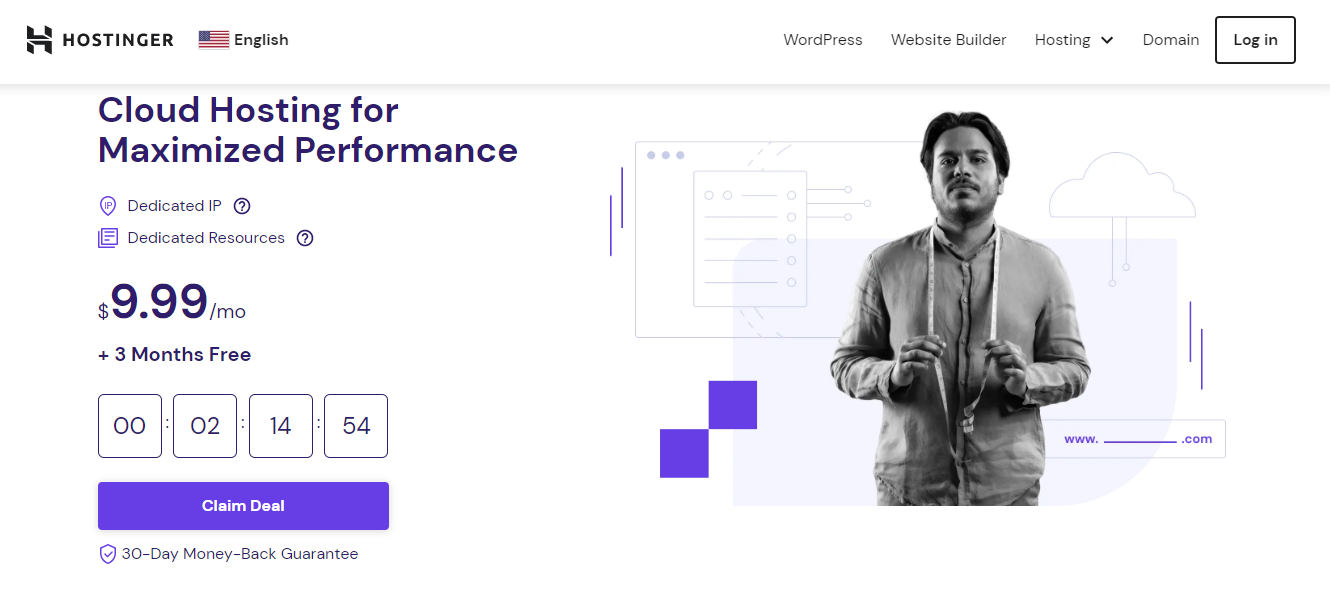






A2 Hosting sets itself apart with its Turbo Server choice, exclusively created to cater to customers who require cloud hosting solutions with fast page loading times.
- Overall score: 4.6
- Pricing: 4.6
- Features: 4.7
- Performance: 4.7
- Support: 4.5
- User Friendly: 4.5
Pricing – 4.6: A2 VPS Cloud Hosting pricing ranges from $39.99/month (Managed VPS hosting) for 4GB RAM, 150 SSD Storage, 2TB Transfer, and 2 Cores and $2.99/month (Unmanaged VPS hosting) for 1 website, 20GB SSD storage, 1 Core and 0.5TB Transfer. Paypal and Skrill are methods of payment accepted on A2 hosting, and they also accept Visa, American Express, MasterCard, UnionPay, and Discover credit cards. They also offer free and easy site migration, a money-back guarantee, and free automatic backup.
Features – 4.7: A2 Hosting’s Turbo servers speed up and optimize website performance using caching and HTTP/2. They use SSDs, powerful servers, and optimized software to improve website performance and loading speed. A2 Hosting supports PHP, Ruby on Rails, Python, and more to cater to developers. SSH, Git, and CMS support are also available.
Performance – 4.7: A2 Hosting’s fast performance is due to high-performance servers, modern infrastructure, and SSD storage. They can relocate your site if problems occur and monitor servers to address issues and minimize website availability impact proactively. A2 hosting offers security with firewalls, updates, detection, SSL, and backups for data safety.
Support – 4.5: A2 Hosting provides helpful articles, tutorials, and FAQs to aid in solving common issues and technical difficulties. 24/7 customer service is available via live chat, phone, and ticketing to ensure timely assistance.
User Friendly – 4.5: A2 Hosting provides cPanel for easy hosting management and one-click CMS installations for WordPress, Joomla, and Drupal. A2 Hosting provides hassle-free website builders for non-technical users. They also offer templates and interfaces for professional websites and support developers with programming tools and frameworks.
Additional Parameters – Website Staging: A2 Hosting offers website staging for testing. Customers can update their websites without affecting the live site with this feature.
Pros & Cons
Pros:
- High Performance
- Turbo services
- Reliable Uptime
- Developer-friendly Environment
- Choice of server locations
Cons:
- Pricey managed VPS hosting plans
- Limited resources on some plans
- No free domain
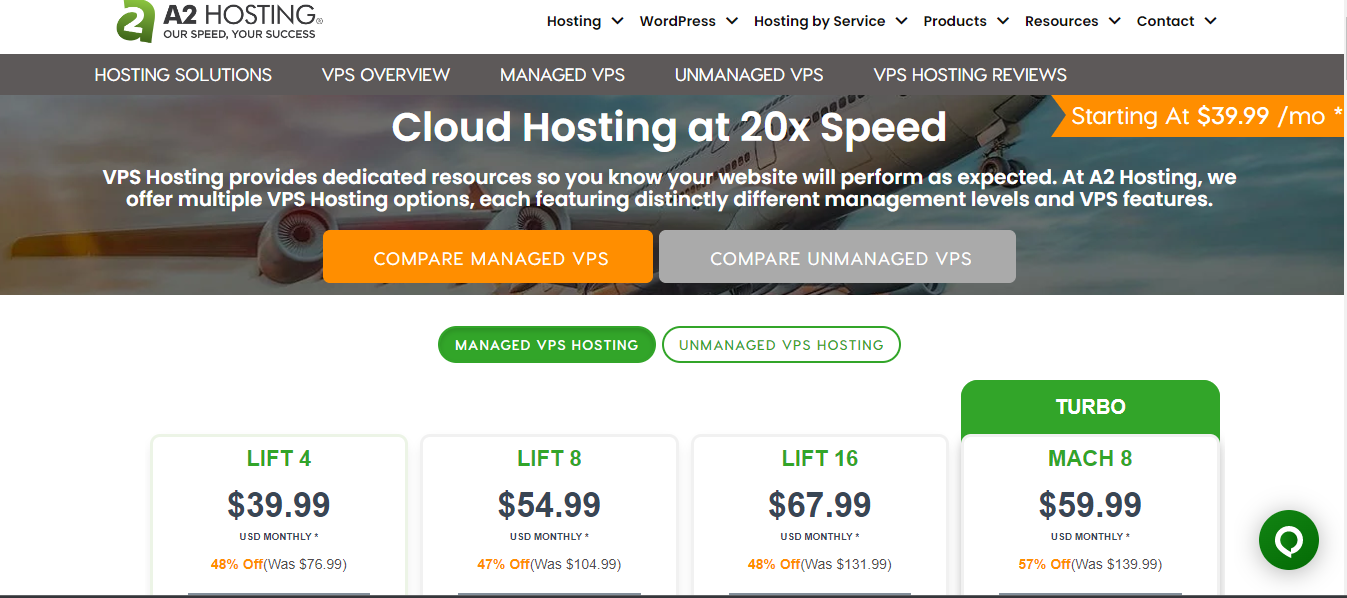






Cloudways offers managed cloud hosting solutions to support websites and applications utilizing prominent cloud providers such as Amazon Web Services (AWS), Google Cloud Platform (GCP), DigitalOcean, Linode, and Vultr. These hosting providers facilitate server management, allowing for a dedicated focus on creating content.
- Overall score – 4.5
- Pricing – 4.5
- Features – 4.6
- Performance – 4.7
- Support – 4.5
- User-friendliness – 4.5
Pricing – 4.5: Cloudways cloud hosting pricing starts at $11/month for 1 GB RAM, 1 Core Processor, 25 GB Storage, and 1 TB Bandwidth. They offer a pay-as-you-go pricing option and a 3-day trial without a credit card. Major credit cards are accepted for plan purchases on Cloudways and PayPal for clients who have upgraded their accounts.
Features – 4.6: Cloudways supports popular CMS and applications like WordPress, Magento, Joomla, Drupal, Laravel, etc., and enhances website performance with SSD servers and caching. Cloudways speeds up page load times and secures hosting space with patches, firewalls, SSL certificates, and optional features.
Performance – 4.7: Cloudways partners with top cloud providers for high-quality infrastructure, minimizing downtime with redundancy. Switch servers for less disruption and prevent downtime through proactive monitoring. Cloudways offers scheduled backups and integrates with CDNs for faster website distribution.
Support – 4.5: Cloudways provides comprehensive resources, including instructional guides, frequently asked questions, system status, knowledge base, blog, case studies and ebooks, Cloudways users group, and 24/7 customer support via live chat and ticketing system.
User-Friendliness – 4.5: Users can easily launch their app with Cloudways’ user-friendly control panel and one-click deployment. Cloudways will handle server tasks while users focus on development. Cloudways offers Varnish, Memcached, and Redis caching options for faster website/app speeds, easily adjusted via their control panel.
Additional Parameters – Easy Server Management: Cloudways seamlessly manages server-related tasks such as establishing, safeguarding, upgrading, and preserving backups to provide an effortless hosting experience, even for individuals without technical knowledge.
Pros and Cons
Pros:
- Easy Management
- Free SSL
- Auto healing
- Regular Security Patching
- HTTP/2 Enabled Servers
- SSH and SFTP Access
- Free Migration
- Real-time monitoring
Cons:
- Technical knowledge required
- Lack of Full Root Access
- Dependency on Cloud Providers

Best Cloud Server Hosting Services: Final Recommendations
We have thoroughly assessed multiple providers of Cloud Server Hosting, considering critical factors such as efficiency, support, quality, affordability, ease of use, and trustworthiness.
Kamatera is our top Cloud Server hosting provider for small businesses, with scalable infrastructure, global data centers, and system support, including Windows, Linux, and Free BSD. They offer cloud hosting services with networking, backup, and snapshot features for improved infrastructure, security, and data protection. It’s available for all individuals and businesses, with custom features, pricing options, and a 99.9% uptime guarantee.
Types of Cloud Hosting and Which Is Right for Small Businesses?
Public Cloud: Public cloud hosting shares infrastructure among multiple users for cost-effectiveness. Public cloud hosting fits small to medium sites/apps with basic resource requirements.
Private Cloud: A private cloud allocates infrastructure for one organization, offering improved protection, management, and customization. It is ideal for enterprises with compliance regulations, sensitive data, or high-security needs.
Managed Cloud: Managed cloud hosting outsources infrastructure management to a service provider who handles tasks like monitoring, security, backups, and updates. It is ideal for businesses and Individuals who want to offload the technical aspects of cloud management to experts.
Unmanaged Cloud: The customer manages server infrastructure in unmanaged cloud hosting while the provider supplies virtual servers. Unmanaged cloud hosting is ideal for tech-savvy clients with IT expertise or experienced admins who manage their own server administration.
Factors to Consider When Choosing a Dedicated Server Hosting
- Feature Set: Evaluate the hardware and software aspects and make comparisons of the pre-installed features available in different cloud hosting packages. Different plans may have compatibility with Linux while not supporting Windows, and there might be variations in the availability of free features across various companies.
- Type of Cloud Hosting: Top cloud hosting providers offer flexibility as you expand. Yet, compile a list of hosting options that fit your needs. Choose from IaaS (Infrastructure as a Service), PaaS (Platform as a Service), and SaaS (Software as a Service) solutions before proceeding.
- Budget: Consider price; what are you paying and getting? Does it fit your budget and renewal costs? Can you get a refund for unsatisfactory service?
- Valuable Insights: Find transparent expert reviews or authentic customer experiences before buying cloud hosting. Check our rankings for honest client feedback, including company satisfaction and dissatisfaction.
- Hardware Components: Define your needs and evaluate the hardware of potential hosts, including CPU, RAM, storage, bandwidth, speed, and security. Are cloud resources adequate for present/future growth?
- Support Assistance: 24/7 chat, email, or phone support is vital for a cloud hosting service. The hosting company’s team should be expert and quick to respond to all queries.
- Security: Evaluate the level of importance and protection needed for your data and security measures. Hosting data on a private cloud ensures higher levels of security. Still, if managed, cloud hosting can go the extra mile by detecting and addressing potential threats through vigilant surveillance and control.
Cloud Server Hosting Vs. VPS Hosting
Cloud hosting employs a cluster of servers to host your website or application rather than relying on a solitary physical server. This is particularly useful for websites that experience fluctuating traffic, necessitate consistent accessibility or demand easily adjustable resources.
Cloud Server hosting offers the agility, duplication, and efficacy necessary to cater to the ever-changing requirements of contemporary online enterprises.
VPS hosting divides a physical server into multiple virtual servers, each with its own OS and hosting environment. They function independently like dedicated servers but are more cost-effective. VPS hosting is perfect for websites and apps that need more control, flexibility, and resources than shared hosting, but not a full server like dedicated hosting.
VPS hosting furnishes a cost-effective hosting answer that blends features akin to dedicated hosting, contributing to its widespread acceptance among businesses of all scales.
How We Rank Cloud Server Hosting Services and How You Should Choose
- Scalable Resources12%
- Cost-Efficiency7%
- Uptime Commitment8%
- Speed and Performance7%
- Security and Backups7%
- Cloud Hosting Features8%
- Ease of Use5%
- Customer Support8%
- User Reviews30%
- Money-Back Guarantee4%
- Other Factors4%
HostAdvice ratings are determined using impartial category-based scores that are appropriately weighted. Our specialists employ cutting-edge technological innovations to conduct impartial evaluations of all hosting firms. Our professionals are committed to constantly improving and implementing new ideas and testing methods in cloud hosting to evaluate industry leaders and accurately adapt to market trends. Recently, Host Advice specialists have introduced novel methods for evaluating uptime and performance based solely on instantaneous outcomes.
Our study depends on honest user reviews. We strive to remove biased and false comments to ensure accuracy, with 30% weight placed on user reviews. HostAdvice experts list 11 factors with allocated percentages for cloud server hosting. Our experts have utilized a range of factors to evaluate and rank the finest cloud hosting providers below:
Scalable Resources (12%): Cloud hosting utilizes a network of interconnected servers to avoid a single system breakdown and allows you to access several servers as deemed necessary. Opt for a cloud service provider that facilitates effortless, instantaneous handling and customization of server assets. You can increase your size from the administration area without needing permission from the service provider.
Cost-Efficiency (7%): Leading cloud hosting providers offer businesses the necessary infrastructure without investing in it upfront. Accurate remuneration for the utilization of resources and speedy increments play a pivotal role. Ensure that your selected cloud hosting service has predetermined boundaries and stable monthly rates.
Uptime Commitment (8%): One advantage of the leading cloud hosting providers is their superior uptime compared to conventional web hosting, ranking third on the list. Securing a cloud hosting provider that boasts impeccable uptime is an advantageous asset. To ensure quality, it is advisable to steer clear of any figure below 99.9%. Thankfully, top-tier cloud hosting firms ensure a minimum uptime of 99.95% to 99.99%, often surpassing these figures.
Speed and Performance (7%): Using superior cloud hosting providers, you can boost website efficiency and speed by accessing nearby remote servers for content delivery. Your website can have fast loading speed and responsiveness with SSDs, which are faster than hard disk drives but have less storage capacity.
Security and Backups (7%): Cloud hosting uses a network of servers around the world, eliminating the necessity for having physical safeguards in place. Websites remain accessible even in the event of problems with the server or security breaches. Ensure to verify the presence of security measures, backup systems, and automatic updates within your chosen cloud hosting package.
Cloud Hosting Features (8%): Choose top-notch cloud hosting for boosted CPU, RAM, and storage. Enjoy unlimited bandwidth, data, and storage. Understand the meaning of “unlimited†before committing. Assess server OS compatibility. Managing cloud servers is crucial for Windows or root access applications.
Ease of Use (5%):
Customer Support (8%): Although forums, tutorials, and knowledge bases are useful resources, having access to a human expert with extensive cloud hosting knowledge and support available around the clock is unparalleled in resolving your concerns.
User Reviews (30%): Our AI technology categorizes the top hosting firms by taking into account the feedback of clients worldwide, encompassing those who are using them for the first time to those who are skilled practitioners and covering all other aspects in between. The operation and assistance of a cloud hosting company can be better understood through the valuable and honest feedback transparently shared by users.
Money-Back Guarantee (4%): The hallmark of superior quality is undeniably a recompense policy. Does the cloud hosting company provide a monetary refund assurance? If so, what is the duration of the offered guarantee?
Other Factors (4%): The criteria for evaluation include accolades, inception date, brand standing, and previous occurrences.
What Is Cloud Hosting and Who Is It For?
Cloud hosting is a proficient technique that employs an intricate network of interconnected servers for web hosting or application deployment. Through this approach, cloud hosting offers exceptional scalability, resilience, and adaptability, ensuring high availability and optimal system performance.
Cloud hosting is ideal for small to medium businesses seeking affordable and scalable hosting without hardware investment. It suits fluctuating traffic and apps well. Cloud hosting also suits e-commerce, startups, and media-rich sites with storage and bandwidth. It saves costs, scales easily, and launches quickly.















